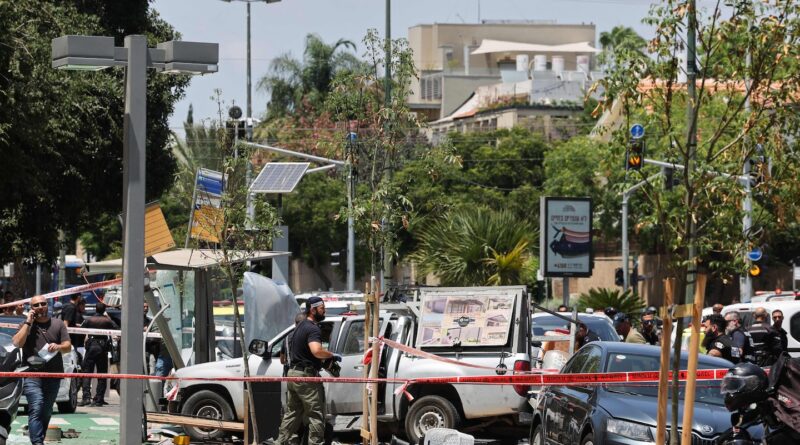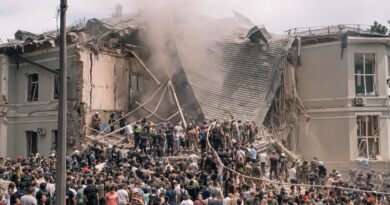Car ramming shakes Tel Aviv as Israeli raid on Jenin enters second day
The attack coincided with an ongoing operation in Jenin that has killed at least 10 Palestinians and injured some 100 more, according to the Palestinian Health Ministry, and has forced thousands to flee their homes.
“The operation in Tel Aviv is the first response of the resistance to what is happening in Jenin,” said Khaled al-Batsh, an official with Palestinian Islamic Jihad, a militant group found in Gaza and the West Bank.
Eitan Dangot, a former Israeli military coordinator for Palestinian civilian affairs in the Gaza Strip and West Bank, said that the military operation that began on Monday aimed “to encircle the Jenin refugee camp as the capital of terrorism,” but that it was only a partial solution that would not sufficiently provide deterrence against future attacks.
Israel’s far-right government needed to develop ties with the Palestinian Authority, which is technically responsible for Jenin, he said, but has abandoned Jenin and other areas in the northern West Bank to lawlessness.
“I don’t see Israel running to take responsibility for the West Bank’s 3 million citizens … including a new generation of militants” who have been abandoned by the PA for nearly two decades, said Dangot, speaking as news broke of the car ramming in Tel Aviv.
In a signal that the operation could soon be completed, the Israeli military said it had 10 targets remaining in Jenin. Far-right members of the government have called for a long-term occupation of the city, which has emerged over the past year as a hotbed for Palestinian militancy.
“There is no point in the camp that we have not been, including the center,” Rear Adm. Daniel Hagari, an IDF spokesman, tweeted, adding that soldiers expected to engage with armed militants throughout the day on Tuesday.
The Israeli army said that, overnight, it dismantled an “underground shaft that was used to store explosive devices in the heart of the Jenin Camp.” The statement added that soldiers destroyed “two operational situation rooms belonging to terrorist organizations in the area … a grenade launcher in the area of Jenin, and confiscated weapons and military equipment.”
Hagari said that all of the 10 Palestinians killed and 120 arrested since the start of the operation on Monday were combatants.
Another Israeli military official, who spoke on the condition of anonymity due to the sensitivity of the security situation, said that another 300 armed combatants were still in Jenin, most in hiding.
According to the Red Cross, an estimated 3,000 Palestinians fled the camp overnight, seeking shelter with family members outside the camp. The Israeli military also suspected that some combatants had also fled overnight, according to Israeli media.
The prolonged ground incursion follows more than a year of near-nightly Israeli military raids that have focused on the Jenin camp and the surrounding area from where many of 50 Palestinians who attacked Israelis have originated.
As West Bank violence has spiraled, Israel has repeatedly asserted that it goes to great lengths to avoid civilian casualties in the crossfire. But the military raids that have in recent months become longer and more frequently during the daytime have killed many civilians. The types of battles being fought and weapons being used on the streets of Jenin are reminiscent of the Palestinian uprising from 2000 to 2005, known as the second intifada.
So far, 2023 is on pace to become one of the deadliest years for Palestinians, with more than 150 fatalities.
Mahmoud Balas, 47, a resident of the Jenin refugee camp said that he, his wife and five children have been too afraid to flee their homes since the operation began on Monday, even as explosions and shootings boomed outside their doors and electricity and water lines were disrupted by the fighting.
“It’s worse than 2002,” he said, referring to what became known as the Battle of Jenin, which lasted more than a week and resulted in at least 50 Palestinians and 23 Israeli soldiers killed.
“They are trying to bring the camp and its people to its knees, because it’s harming them,” Balas added. “But they will not succeed, God willing.”
Many also expected that the operation would continue to fuel the cycle of violence.
“Buildings may crumble, cars may be reduced to wreckage, and countless individuals may be detained, wounded and even martyred,” said a statement from Mostafa Sheta, director of Jenin refugee camp’s Freedom Theater, which was a center of cultural Palestinian resistance throughout the second intifada. “These actions will only serve to breed a new generation that will carry the torch of resistance passed down by those who came before them, as we do today, and as our children will do in the future.”
The Israeli army has said it has to carry out counterterrorism operations because the Palestinian Authority, which technically controls Jenin, is absent and militant groups like Hamas, Islamic Jihad and other smaller organizations are in control.
Hamas spokesman Hazem Qassem said Tuesday that Israeli Prime Minister Benjamin Netanyahu was responsible for the escalation and that Jenin “has been and will remain unbreakable.”
Balousha reported from Gaza City. Sufian Taha in Jerusalem contributed to this report.




